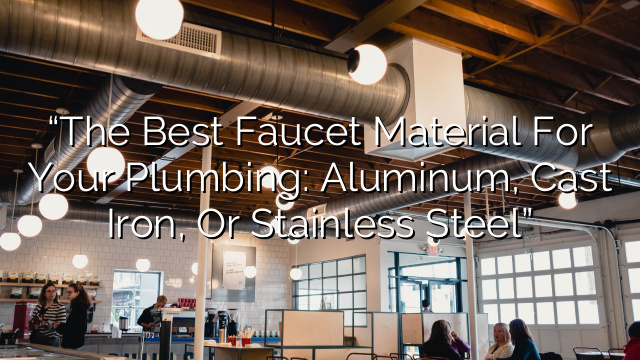Introduction
When it comes to selecting a faucet for your plumbing, one of the most critical decisions you need to make is choosing the right material. The material of your faucet not only affects its durability but also its functionality and overall appearance. In this blog post, we will discuss three popular faucet materials: aluminum, cast iron, and stainless steel. We will explore the pros and cons of each material to help you make an informed decision for your plumbing needs.
Aluminum Faucets
Aluminum faucets are lightweight and corrosion-resistant, making them an ideal choice for many homeowners. They are also relatively affordable, making them a popular option for those on a budget. However, aluminum faucets may not be suitable for all plumbing systems. The following are the key features and considerations of aluminum faucets:
- Pros
- Lightweight and easy to install
- Corrosion-resistant
- Affordable
- Cons
- Less durable compared to other materials
- May not be suitable for high-pressure plumbing systems
- May require frequent maintenance
Cast Iron Faucets
Cast iron faucets are known for their durability and strength. They can withstand high water pressure and heavy daily use, making them a popular choice for commercial buildings and busy households. While cast iron faucets tend to be more expensive than other materials, their longevity and reliability make them a worthwhile investment. Consider the following factors when considering cast iron faucets:
- Pros
- Durable and long-lasting
- Resistant to high water pressure and heavy use
- Low maintenance
- Cons
- More expensive than other materials
- Heavy and may require extra support during installation
- May rust over time if not properly cared for
Stainless Steel Faucets
Stainless steel faucets are the most versatile option, suitable for both residential and commercial plumbing systems. They are highly durable, resistant to corrosion, and easy to clean. Stainless steel faucets also offer a sleek and modern appearance that can complement any kitchen or bathroom style. Here are the key factors to consider when choosing stainless steel faucets:
- Pros
- Highly durable and long-lasting
- Corrosion-resistant
- Easy to clean and maintain
- Wide range of styles and finishes
- Cons
- Can be more expensive than other materials
- May show fingerprints and water spots
- Less impact-resistant compared to cast iron
Which Faucet Material Should You Choose?
Choosing the best faucet material for your plumbing depends on several factors such as your budget, the level of use, and the overall aesthetics you desire. If you’re on a tight budget and have a low-pressure plumbing system, aluminum faucets can be a suitable choice. However, if durability and longevity are your priorities, cast iron or stainless steel faucets may be a better option.
For commercial buildings or households with heavy use, cast iron faucets offer unbeatable strength and resistance to wear and tear. They may require a slightly larger investment upfront but can save you money in the long run by minimizing the need for repairs or replacements.
If you’re looking for a material that combines durability, aesthetics, and ease of maintenance, stainless steel faucets are an excellent choice. They offer a timeless look that can complement any kitchen or bathroom decor, and they are resistant to both corrosion and staining.
FAQs
Q: Are aluminum faucets suitable for a kitchen sink?
A: While aluminum faucets can be installed in a kitchen sink, they may not be the most practical choice. Kitchen sinks tend to experience heavier use, and aluminum may not be as durable or resistant to high water pressure as cast iron or stainless steel.
Q: Can cast iron faucets rust?
A: Cast iron faucets can rust over time if they are not properly cared for. Regular cleaning and maintenance can help prevent rust and extend the lifespan of cast iron faucets.
Q: Do stainless steel faucets require special cleaning products?
A: Stainless steel faucets are relatively easy to clean and maintain. Most stains and water spots can be removed with mild soap and water. However, to maintain their shine and appearance, it’s best to avoid abrasive cleaners that can scratch the surface.
Q: How do I ensure the longevity of my faucets regardless of the material?
A: Regardless of the material, proper maintenance is key to ensuring the longevity of your faucets. Avoid using harsh chemicals or abrasive materials that can damage the finish. Regularly clean the faucet to remove dirt and grime that can accumulate over time. Additionally, fix any leaks promptly to prevent water damage and further deterioration of the faucet.
When selecting the best faucet material for your plumbing, consider your unique needs, budget, and aesthetic preferences. By carefully evaluating the pros and cons of aluminum, cast iron, and stainless steel faucets, you can make an informed decision that will enhance both the functionality and appearance of your plumbing system.







